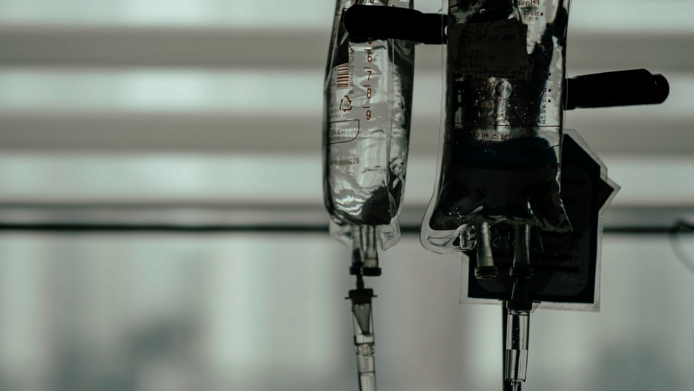New therapeutic approach designed to improve life with donor lungs

In greatly advanced lung disease there is often only one form of therapy to prevent a fatal outcome - transplantation. At a time when the world is struggling with the Covid-19 epidemic, which in its most severe forms can lead to lung failure, improving transplantation therapy is a particularly relevant issue. The Medical University of Vienna is one of the world's leading institutions in this field. Together with the Vienna General Hospital (AKH Wien), they carried out one of the world's first lung transplantations on a Covid-19 patient this year. Within the Thoracic Surgery Department, the Vienna Lung Transplantation Research Group is a highly specialised group of researchers working on the further development of this form of therapy. Under the lead of Walter Klepetko, Head of the Department of Surgery and responsible for the sensational lung transplantation in a Covid-19 patient, Konrad Hoetzenecker, a surgeon and professor for lung transplantation, and his team, which includes the internal medicine specialist Peter Jaksch and the surgeon Alberto Benazzo, are doing research in this field. Peter Jaksch was the winner of the 2019 Gottfried and Vera Weiss Prize. In the context of this annual funding programme, which is awarded by the FWF on behalf of the Weiss Foundation, the researchers of the Vienna Lung Transplantation Research Group are currently engaged in an ongoing clinical study which focuses on the improvement of kidney function after lung transplantation. Transplantation patients receive drugs that switch off the immune system and thus ensure that the body accepts the new lung, but that involves an impairment of other organs – and the kidneys are particularly affected in this case.
Previous drugs put long-term stress on the kidneys
“Lung transplantation is a great strain on the body, both post-surgery and in the long run. Particularly in the first few years there are changes in the inner organs occur, and complications may also arise,” explains Alberto Benazzo. “Renal insufficiency is one of the most common problems in this context.” Studies show that five years after a lung transplant more than 50 percent of patients suffer from such impairment of the kidneys, and after ten years the rate climbs to over 70 percent. The drugs responsible for this are so-called calcineurin inhibitors (CNIs), which are used for immunosuppression – i.e. to reduce the body's own immune cells that attack the new organ – but have a toxic effect on the kidney as a side effect. The most commonly used immunosuppressive agent is tacrolimus. In their current project, Benazzo, Jaksch and their colleagues are working on a new immunosuppressive strategy that will make it possible to reduce the use of this drug and at the same time increase the immune system's tolerance of the new organ. As a matter of principle, there are two stages of treatment after transplantation, explains Benazzo: “Immediately after surgery, high doses of immunosuppressive drugs are administered as part of a so-called induction therapy, which eliminates a large proportion of the relevant immune defence cells within a short time. Thereafter, a lower-dose long-term therapy, also called maintenance therapy, is designed to keep the immune defence at the required low level.”
Greater tolerance of donor organs
In the field of induction therapy, the Medical University of Vienna is a pioneer in the use of alemtuzumab – a substance that was originally developed for keeping the immune system at bay in cases of multiple sclerosis and is based on a concept that differs fundamentally from CNIs. The new strategy now envisages also reducing tacrolimus in the maintenance therapy stage and partially replacing it with the immunosuppressive agent everolimus. “This drug, which has previously been used mainly for kidney transplants, is also based on a completely different concept than the CNIs. Not only does it have a lower impact on the kidney, but we also have data showing that it increases the body's tolerance of a transplanted organ,” Benazzo emphasises. A total of 110 patients are participating in an ongoing randomised trial. 55 of them are being treated with the new suppression strategy. One measure of success will be a key indicator that shows how well the kidneys are filtering the blood influx. What does Benazzo, who developed this study design, hope to achieve with the new suppression strategy? “When we have a result next year, we expect it to show a 20 percent improvement in kidney function compared to the previous therapy,” Benazzo explains. “The second objective is to check whether the new combination of medication actually increases the body’s tolerance of the new organ.”
Personal details Alberto Benazzo is a surgeon whose medical research focus lies in the field of transplantation immunology. Together with the internal medicine specialist Peter Jaksch, he is conducting research as part of the Vienna Lung Transplantation Research Group in the Division of Thoracic Surgery in the Department of Surgery, Medical University of Vienna and Vienna General Hospital. Jaksch was awarded the privately endowed Weiss Prize in 2019, which is awarded annually by the FWF and supports the project described above with a funding volume of almost 382,000 euros. Konrad Hoetzenecker has been working at the Division of Thoracic Surgery since 2010. After a one-year research stay abroad as part of the Graham Memorial Traveling Fellowship run by the American Association of Thoracic Surgery, Hoetzenecker took over the management of the lung transplantation programme in 2018.
Publications





